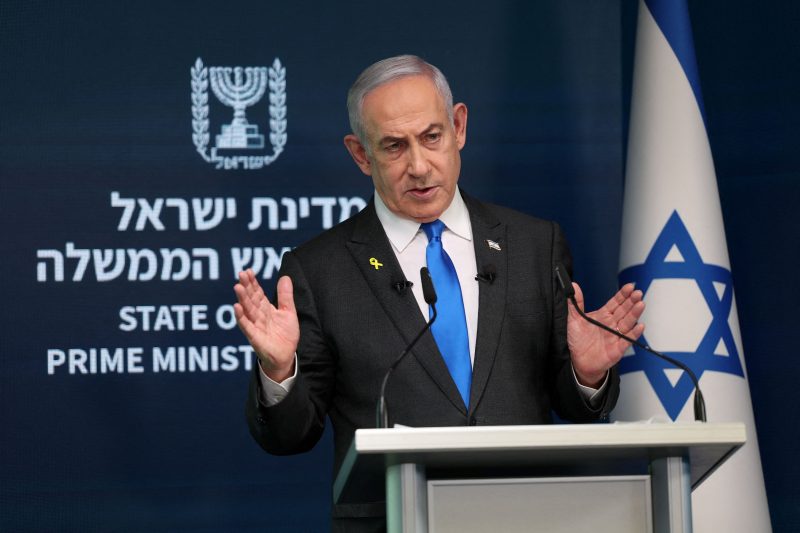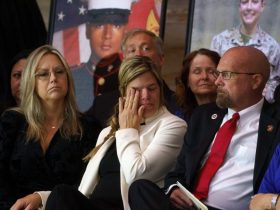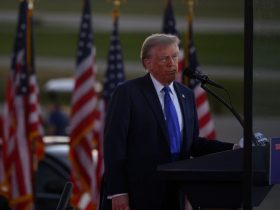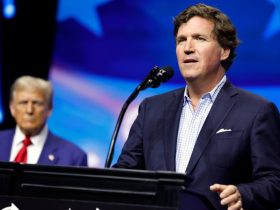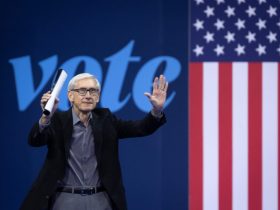Israel’s Prime Minister Benjamin Netanyahu on Thursday dismissed a U.S.-backed push for a 21-day cease-fire with Hezbollah in Lebanon and vowed that fighting would continue, even as Biden administration officials complained that Israel was fully informed of the truce proposal and indicated Netanyahu had agreed to it.
After arriving in New York for a speech Friday morning to the U.N. General Assembly, the Israeli leader told reporters, “The policy is clear: We will continue striking Hezbollah with full force — we will not stop until we achieve all of our objectives.” Earlier, his office called reports that Israel had eased up on fighting in Lebanon “the opposite of the truth.”
Less than a day before, administration officials had described a statement, signed by the United States and major European and Middle East allies, released Wednesday night as a major development. It was accompanied by a high-level background briefing for reporters. The statement called for a temporary halt in the escalating conflict to negotiate a more permanent cease-fire.
In a sharp pushback to Netanyahu on Thursday, the Biden administration described his rejection of the temporary truce as a bait and switch.
“A lot of care and effort was put into that statement,” including extensive conversations with senior Israeli officials, National Security Council spokesman John Kirby told reporters. “And we wouldn’t have made that statement if we didn’t have reason to believe that the conversations that we were having, with the Israelis in particular, were supportive of that goal.”
The statement, he said, “wasn’t just drawn up in a vacuum. It was done after careful consultation, not only with the countries that signed on to it, but Israel itself. … And we had every reason to believe that … in the drafting of it, and in the delivery of it, that the Israelis were fully informed … and fully aware of every word in it. And we wouldn’t have done it, as I said, if we didn’t believe … that it would be received with the seriousness with which it was composed.”
Asked directly if he was saying that the statement would not have been released if there had been uncertainty about Israeli’s position, Kirby said, “I didn’t state exactly those words, but I’m not going to disagree.” He added that U.S. officials were continuing conversations with Netanyahu and his team in New York, and would be listening carefully Friday morning to Netanyahu’s U.N. address.
For the past year, as Israel has conducted its separate war against Hamas militants in Gaza, U.S. officials have frequently referred to hard-line statements Netanyahu has made in public as differing from their private conversations with him. Expressing frustration, they have described him as seeking to assuage certain members of his political coalition who have threatened to bring down his government if he does not comply with their demands.
Israel’s far-right national security minister, Itamar Ben Gvir, said Thursday he had informed Netanyahu that if a temporary cease-fire with Hezbollah is agreed to, his party would not vote with the coalition, and if the cease-fire became permanent, then his party would withdraw from the government, threatening Netanyahu’s hold on power.
But the rejection wasn’t confined to small, extreme elements in Israel’s governing coalition. Foreign Minister Israel Katz, a member of Netanyahu’s Likud party, said in a social media post: “There will be no cease-fire in the North. We will continue to fight against Hezbollah with all our strength until victory.”
In their Wednesday night background briefing for reporters after the cease-fire plan was announced, a senior Biden administration official said that it had been discussed with both Israel and Lebanon, and that those who endorsed the statement “felt this was the right moment to issue the call based on our discussions.” The parties involved, Israel and Lebanon, “are familiar with the text,” said the official, who spoke on the condition of anonymity under rules set by the White House.
The United States does not speak with Hezbollah, a U.S.-designated foreign terrorist organization. Its conversations have been with the government in Lebanon, where Hezbollah holds seats in parliament and exerts control over wide swaths of territory. The group has so far made no statement about the cease-fire proposal.
Although Lebanese Prime Minister Najib Mikati has praised efforts by the United States and France to “put an end to this dirty war,” his press office on Thursday denied reports that he had signed the proposed agreement during a meeting with Secretary of State Antony Blinken and U.S. mediator Amos Hochstein.
While the proposal was welcome, the statement said, “the true test lies in its implementation, particularly through Israel’s commitment to international resolutions.”
In addition to conversations with the two parties involved, U.S. officials said the statement was the outcome of nonstop U.S. and French diplomacy with the signers at the U.N. General Assembly meeting, where numerous heads of state and senior officials are gathered.
For most of this year, the administration has tried to negotiate a cease-fire calling for the withdrawal of Hezbollah to the Litani River, about 18 miles north of the Israeli border — as demanded years ago in a U.N. Security Council resolution — and resolution of territorial disputes so that tens of thousands of people who have been displaced on both sides of the border can return to their homes.
Israel and Hezbollah have been in low-level conflict for years, and in 2006 fought a brief war. The current round of conflict began on Oct. 8 with Hezbollah regularly firing rockets into northern Israel in support, it said, of Hamas forces battling Israel in Gaza. Hezbollah leader Hasan Nasrallah has said they would stop when Israel stops the war in Gaza. Both Hezbollah and Hamas are proxy militias of Iran, which serves as their main weapons supplier.
Israel escalated its return fire in recent weeks, including the dramatic sabotage of pagers and other communications equipment used by Hezbollah, the subsequent air assault that has left hundreds dead, and now the massing of ground troops that have given rise to fears that the region is on the verge of a full-scale war.
Separate U.S.-led negotiations over a cease-fire deal in the Gaza war, which began Oct. 7 with a Hamas incursion into southern Israel that left around 1,200 people dead and 250 taken hostage, have continued without success. The Biden administration hopes that an Israel-Lebanon truce would “open up diplomatic space as well to galvanize efforts” for resolution on the “very important primary effort we have to bring the hostages home” and stop the fighting in Gaza.
As cross-border strikes continued Thursday, the Israel Defense Forces said in a statement that it killed the head of a unit in Hezbollah’s drone force in the southern suburbs of Beirut, where it assassinated prominent Hezbollah official Ibrahim Aqil last week. Videos showed massive plumes of spoke rising from the apartment that was struck, and Lebanon’s Health Ministry said two people were killed and 15 wounded in the strike.
Across southern Lebanon, the IDF said its fighter jets struck Hezbollah “military sites, terrorists and weapons storage facilities,” while in a rare attack along the border with Syria, the IDF struck infrastructure that Hezbollah had used to transfer weapons into Lebanon.
Lebanon’s Health Ministry said Thursday that 20 people — including 19 Syrians — were killed in an Israeli attack on Younine, near Lebanon’s border.
The total death toll in Lebanon since Israel began pounding the country with hundreds of airstrikes on Sunday has risen past 600, according to the Health Ministry, which does not distinguish between civilians and combatants in its count of the dead and injured.
Israeli leaders said that the IDF’s 7th Brigade on Thursday morning concluded an exercise near the Lebanese border training troops in “maneuvering and combat in thicketed, mountainous terrain.” The exercise, the IDF said, was intended so that troops would be ready for “various combat scenarios in enemy territory.”
Across Lebanon, there are more than 70,000 people officially registered in shelters, said Bassam Mawlawi, the minister of interior and municipalities in the caretaker government. About an equal number have evacuated northern Israel since the regular Hezbollah strikes began last October.
Chason reported from Tel Aviv. Lior Soroka in Tel Aviv, Suzan Haidamous and Mohamad El Chamaa in Beirut, and Hajar Harb in London contributed to this report.

